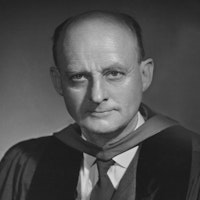The character of both nations and individuals may be defined as a pattern of consistent behavior, created on the one hand by an original ethnic, geographic and cultural endowment, and on the other hand by the vicissitudes of history, which shape and reshape, purify, corrupt and transmute this endowment.
Reinhold Niebuhr

A Pattern of Consistent Behavior
Topic: Justice, Vision, & Leadership
“The character of both nations and individuals may be defined as a pattern of consistent behavior, created on the one hand by an original ethnic, geographic and cultural endowment, and on the other hand by the vicissitudes of history, which shape and reshape, purify, corrupt and transmute this endowment.”
Karl Paul Reinhold Niebuhr, June 21, 1892 – June 1, 1971) was an American theologian, ethicist, commentator on politics and public affairs, and professor at Union Theological Seminary for more than 30 years. Niebuhr was one of America's leading public intellectuals for several decades of the 20th century and received the Presidential Medal of Freedom in 1964. A public theologian, he wrote and spoke frequently about the intersection of religion, politics, and public policy, with his most influential books including Moral Man and Immoral Society and The Nature and Destiny of Man, the second of which Modern Library ranked one of the top 20 nonfiction books of the twentieth century.
A Nation So Conceived
Niebuhr, Reinhold, and Alan Heimert. A Nation so Conceived: Reflections on the History of America from Its Early Visions to Its Present Power. Greenwood Press, 1983, p. 7 [Reinhold Niebuhr and Alain Heimert. A Nation So Conceived].

Reinhold Niebuhr
Copyright © 2017 – 2024 LuminaryQuotes.com About Us

Commentary by Martin E. Marty
Niebuhr could mourn the failure of good ideas in America. He was constantly critical of the way Puritans in practice corrupted their idea of taking “prosperity and adversity in its stride [into] a religion which became preoccupied with the prosperity of the new community.” In doing so they came to see Jefferson’s”‘Useful knowledge’ as the only valuable knowledge,” it was “Knowledge ‘applied to common purposes of life.'”
[The Irony of American History, New York, 1952, p.49]
–Reinhold Niebuhr [Public Theology and the American Experience, Martin E. Marty in the Journal of Religion, 1974]
Additional Reinhold Niebuhr Quotes
“We are always part of the drama of life which we behold; and the emotions of the drama therefore color our beholding.”
–Reinhold Niebuhr, Discerning the Signs of the Times, 1946, p. 10